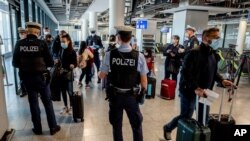German officials said Wednesday the country will extend COVID-19-related border restrictions with the Czech Republic for another two weeks as they try to bring the third wave of coronavirus outbreaks under control.
At a Berlin news conference, German Interior Minister Horst Seehofer said the COVID-19 situation is still “not stable” in the Czech Republic and will ask border patrols to check anyone wishing to enter Germany from the nation to provide a negative test and then go into quarantine for 14 days.
Seehofer said the situation in Austria’s Tyrol region has "improved considerably," so he will be allowing border controls for that region to expire.
But he told reporters he has asked German border patrols to conduct random spot checks along all of Germany’s borders, including France, Denmark and Poland, over the next two weeks, particularly after the Easter holiday.
The announcement comes as rules came into force making testing mandatory for all air travelers to Germany, regardless of whether they come from a risk area or an area with virus mutants.
The tougher measures take effect as Germany struggles to slow a rise in coronavirus infections, driven by new, more contagious virus strains. Experts warn that the vaccination pace remains too slow to break a third wave of the pandemic.





